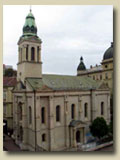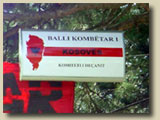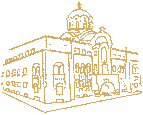|
|
Information
Service of
the Serbian Orthodox Church
April
10, 2006

HOLY WATER IN THE METROPOLITANATE OF ZAGREB AND LJUBLJANA
In his correspondence to the Serbian Orthodox Church’s Holy Synod of Bishops in Belgrade (document number 56/06) His Eminence Metropolitan Jovan of Zagreb and Ljubljana informs the Holy Synod of the following:
 In parishes belonging to the parish in Narta, the hierarchal administrative district of Bjelovar, Marca Monastery, Lipovcani, Ivanic Grad-Graberje and Kriz the parish priest has informed the Metropolitan by official act of the following: In parishes belonging to the parish in Narta, the hierarchal administrative district of Bjelovar, Marca Monastery, Lipovcani, Ivanic Grad-Graberje and Kriz the parish priest has informed the Metropolitan by official act of the following:
In Narta Marija Zakula converted to the Roman Catholic faith. In the village of Laminac Marija Popovic converted to the Roman Catholic faith. Srdija Gajica converted to the Roman Catholic faith. Several households in the village of Bosiljevo converted to the Roman Catholic faith. Nevenka Jelaca and one house in Marinkovac Donji have been converted to the Roman Catholic faith (Djordje Puvaca and Ljiljana Herceg). In the village of Sumece only one Orthodox house remains as the other five or six houses have converted to the Roman Catholic faith. In Graberje Ivanicko three houses have converted to the Roman Catholic faith. In the village of Dejanovac all former Orthodox faithful have converted to the Roman Catholic faith. In the village of Blatnica Milka Vujicic converted to the Roman Catholic faith. In the village of Lipovcani Milan Davidovic and two members of his family and Stevo Davidovic and four members of his family converted to the Roman Catholic faith. In the village of Dragicevac Josip Galic (who celebrated the feast of St. Nicholas) and two members of his family converted to the Roman Catholic faith. In the village of Dereza Nenad Visnjic and Dusan Radosavac converted to the Roman Catholic faith. In the village of Derezana two houses converted to the Roman Catholic faith.
All of the aforementioned locations formerly belonged to the Severin and later the Lepavina diocese, which was territory where the infamous Marcha Uniate raged.
Source: Metropolitanate of Zagreb and Ljubljana

UNMIK GETS ULTIMATUM FOR PROTECTING VISOKI DECANI MONASTERY
 In yesterday's issue of the Pristina Albanian language daily "Epoka e Re", the rightwing extremist organization "Vetevendosje" (Self-determination), which is headed by Albin Kurti, continued to threaten the Serbian Orthodox Church and UNMIK by citing a series of unfounded accusations for the purpose of heightening ethnic tensions and provoking violence against Christian Orthodox holy shrines in Kosovo. In yesterday's issue of the Pristina Albanian language daily "Epoka e Re", the rightwing extremist organization "Vetevendosje" (Self-determination), which is headed by Albin Kurti, continued to threaten the Serbian Orthodox Church and UNMIK by citing a series of unfounded accusations for the purpose of heightening ethnic tensions and provoking violence against Christian Orthodox holy shrines in Kosovo.
According to well-informed international sources in Pristina this letter and the campaign that has been conducted for months against Visoki Decani Monastery, as Kosovo's only UNESCO World Heritage Site and the idea of protection of Orthodox holy shrines in Kosovo in general, are supported by political and extremist circles that are merely using Kurti as a spokesman. It is a well-known fact that Kurti's activists work closely with the local Association of KLA War Veterans, led by Abdyl Mushkolaj, who is one of the signatories of the letter. Mushkolaj and his gunmen threatened the Monastery and KFOR last year. Among other signatories are the ultraradical Balli Kombetar (National Front) and LKCK which openly advocate greater Albania in their political agenda, but also the PDK chapter in Decani. Further behind are some mafia circles which plan to develop their illegal activities in the situation of almost total legal vacuum and serious absence of international presence.
According to these sources, these are extremely radical organizations with anti-Western orientation whose goal is not only the expulsion of the remaining Serbs from Kosovo but also leaving of international peacekeeping forces and UNMIK, which they often accuse of "colonization of Kosovo". These political forces are involved in organized crime and are particularly opposed to the return of Serb refugees, whom they call "colonizers". Presumably this is the reason why not one Serb has returned to his home in Decani municipality in the past almost seven years
Recently in the town of Decani in the very street where the return of several Serb families who lived there before is scheduled to begin (the former Monastery Street, which was renamed Skenderbeg Street last year) appeared a large banner over the street with the slogan of the organization "Balli Kombetar" (National Front), also one of the signatories of the open letter to the UNMIK chief. Balli Kombetar was an infamous Nazi organization during the Second World War which acts in post-war Kosovo as a right oriented party advocating an ethnic Albania with Kosovo as its center, including parts of northern Greece as well as Montenegro. A map of so called ethnic Albania is prominently displaced on a tree above the organization's booth, which was put up overnight on the sidewalk. At the same time that this slogan is being emphasized, a trilingual sign indicating Decani Monastery which was put up by Decani Monastery at UNMIK's insistence has been removed for the sixth time. So far the Municipal authorities have failed to react to this open provocation.
The signatories of Albin Kurti's open letter to the UNMIK chief demand that Soren Jessen-Petersen not extend the decision regarding the Special Zoning Area around Decani Monastery. "Otherwise," the letter goes on to say, "we swear to take any necessary actions for preventing this process which seriously harms the future of our country."
Signatories of the letter demand a response from Petersen within the next five days.
During the last six post-war years Decani Monastery has been targeted with grenades by Albanian extremists three times. A building owned by the monastery in the center of the town of Decani which formerly served as the public library was destroyed in 2002 and no one has been prosecuted for this deed. KLA war veterans insisted to use the plot of the former library as their parking lot.
Not one Kosovo official has responded to the media campaign and threats against Visoki Decani Monastery even though informally one can hear that the threats are coming from organizations that "do not have much influence on the people" and which "want to attract the attention of the public with radical statements". However, the attempts of Kosovo officials to minimize the seriousness of the situation and the lack of readiness to explain to the people the real reasons behind the protection of Orthodox religious sites, in the opinion of international officials in Pristina, only further contributes to unfounded speculation and makes room for further activities by radical circles.
A steady increase of ultra-radical activities in the Western part of Kosovo is a consequence of weak and corrupted institutions which are dominated by family clans and mafia. In its efforts to transfer competencies to Kosovo institutions UNMIK has practically left this part of Kosovo into the hands of local gangs which live mostly from smuggling and illegal activities in the triangle between North Albania - Kosovo and Albanian inhabited part of Montenegro. International police has been almost completely withdrawn from the area while the local Kosovo Police Force, even if they would chose to do their job would hardly risk confrontation with powerful clans. In such an environment nationalist ideas and ethnic hatred present an easy food for the young generation.
UNMIK has still not officially responded to the Kurti's ultimatum but in yesterday's edition of the Pristina Albanian language daily "Ekspres", the acting UNMIK deputy chief Patricia Warring issued a public response from UNMIK regarding to a recently published article citing the same arguments against the Special Zoning Area around Visoki Decani Monastery as in the letter of Kurti's Self-determination.
The letter of Patricia Warring states the following:
"I would like to emphasize that the Special Zoning Area of Decane was established to preserve the unique natural beauty and the world cultural heritage of the Decane canyon from illegal construction, unregulated exploitation of resources and speculative activities. The Special Zoning Area has not stopped private land owners from cultivating their land or using it for other purposes that do not risk damaging the area’s outstanding cultural and natural value. The Special Zoning Area was neither established to limit access to the canyon or to make the movement of people more difficult. As the Special Representative of the Secretary-General (SRSG) Soren Jessen-Petersen has said, 'The canyon and the Monastery are special treasures which must be preserved as part of the long-term sustainable development of the area. Our children will not forgive us if we allow them to be damaged by illegal or irresponsible activity,'" says the acting deputy UNMIK head in her letter.
With regards to these issues and the protection and restoration of Serbian Orthodox holy shrines in Kosovo, Bishop Teodosije of Lipljan met last week with the KFOR commander, Italian General Giuseppe Valotto, and the head of the U.S. Office in Pristina, Philip Goldberg, who demonstrated a high degree of understanding for the situation in which this and all other Serbian holy shrines are living, particularly in the western part of the Province. In the next few days Bishop Teodosije will discuss this and other related issues with UNMIK chief Soren Jessen-Petersen. During the course of its recent visit to the United States, the Serbian Orthodox Church delegation informed representatives of the U.S. Congress and Department of State in detail regarding the campaign against Decani Monastery and other attacks against the Serbian Orthodox Church and its heritage in Kosovo.
"The position of the Serbian Orthodox Church (SOC) with regard to this issue is clear," said Bishop Teodosije of Lipljan, who is also the abbot of Visoki Decani Monastery and the vice-chairman of the SOC Kosovo and Metohija Committee, commenting on the most recent threats by Kurti's activists. "The protection of the Serbian spiritual and cultural heritage is a priority that has been especially emphasized by the SOC Holy Assembly of Bishops, as well as by the member countries of the Contact Group, and this issue will be discussed separately during the course of the negotiating process. The goal of the SOC is not to politicize her holy shrines but to enable their sustainable survival under present conditions of threatened security and lack of basic freedoms for the majority of monastic communities in Kosovo and Metohija. On our part we will do everything through dialogue to build confidence with all people of good will; however, we expect UNMIK, KFOR and international diplomatic representatives in Pristina to make it clear to the Kosovo government that tolerating threats, blackmail and aggressive behavior on the part of irresponsible individuals and groups against centuries-old Christian holy shrines and cultural monuments deeply undermines the building of a stable society in this region. We expect appropriate Kosovo institutions as well as all citizens of Kosovo of good will to ignore these ill-intended accusations based on arbitrary speculation and to give their active contribution to the building of a tolerant and multiethnic society," explained Bishop Teodosije.
The Serbian Orthodox Church is convinced that the most recent threats of radical organizations such as Kurti's Self-determination and KLA War Veterans will only reinforce the need for special and internationally granted institutional protection for Serbian Orthodox shrines in Kosovo, and the continuation of a long term NATO military presence, particularly in Western part of Kosovo where Orthodox monasteries are still guarded by KFOR. SOC is advocating a comprehensive model of internationally granted protection which would protect its shrines and preserve them for the future in Kosovo regardless of its future status. Its positions have been clearly stated in its Ten Guiding Principles.
After these latest threats against Visoki Decani Monastery NATO peacekeepers have increased the level of security. Circles close to the KFOR HQ say that if anyone tries to do anything it will not be difficult to guess who is behind it because KFOR has been following activities of the aforementioned groups and individuals for some time. In case these groups try to undermine security of citizens KFOR's reaction will be decisive, advised a representative of international peacekeeping forces who wished to remain anonymous.


Copyright © 1999-2006 by
The Information Service of the Serbian Orthodox Church
11000 Belgrade
Kralja Petra I no.5
+381 11 3282 596
e-mail
|

